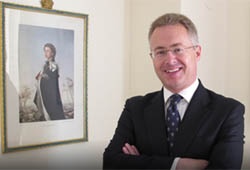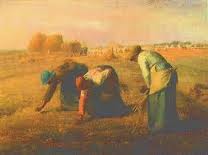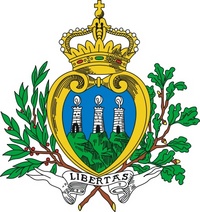“The government of Ireland also welcomed the Holy See’s apology to the families and the shame the Vatican has felt. The Irish government concluded by saying that lessons had been learned and looks forward to a new dialogue.”
Category: Faith & the Public Order
Pope speaks with new British Ambassador to the Holy See
This morning Pope Benedict XVI received the new Ambassador of Great Britain to the Holy See, Nigel Marcus Baker in an audeince where the new ambassador presented his credentials to the Pope.
Ambassador Nigel Marcus Baker, 45, succeeds Francis Campbell who moved after a term of service to the Holy See to another post. The new ambassador has worked with his country’s diplomatic service in Central Europe and in South America; recently he was in Bolivia. Baker has worked in the Private Office of Prince Charles and for two years lived and studied in Italy. He’s married and has one son.
Today’s address is basically diplo-speak, but there are a few points made by Benedict which are worth thinking about today. I am especially focussing on the Pope’s mention of charity, values, relativism, ecomony, and education. In part, the Pope spoke of the UK stituation of government but what he said has implications in the US:
Continue reading Pope speaks with new British Ambassador to the Holy See
John Paul II’s Laborem exercens makes 30 years
must earn his daily bread and contribute to the continual advance of science
and technology and, above all, to elevating unceasingly the cultural and moral
level of the society within which he lives in community with those who belong
to the same family. And work means any activity by man, whether manual or
intellectual, whatever its nature or circumstances; it means any human activity
that can and must be recognized as work, in the midst of all the many
activities of which man is capable and to which he is predisposed by his very
nature, by virtue of humanity itself. Man is made to be in the visible universe
an image and likeness of God himself, and he is placed in it in order to subdue
the earth. From the beginning therefore he is called to work. Work is one of
the characteristics that distinguish man from the rest of creatures, whose
activity for sustaining their lives cannot be called work. Only man is capable
of work, and only man works, at the same time by work occupying his existence
on earth. Thus work bears a particular mark of man and of humanity, the mark of
a person operating within a community of persons. And this mark decides its
interior characteristics; in a sense it constitutes its very nature.
Continue reading John Paul II’s Laborem exercens makes 30 years
Labor Day: “the Church has been and is on the side of the worker”
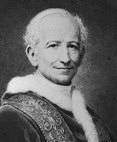 When Pope XIII published Rerum Novarum (On the Condition of Labour) in 1892, it was considered a brilliant piece of thinking on the Church walking closely with the average man and woman because it demonstrated that in reality, once again, the Church situated herself in the reality of human existence: in the social, political and economic spheres with a keen recognition of human dignity; the protection of basic economic and political rights, including the right to a just wage and to organize associations or unions to defend just claims; the right to private property; the rights of labor over capital; the just organizations of society for the common good.
When Pope XIII published Rerum Novarum (On the Condition of Labour) in 1892, it was considered a brilliant piece of thinking on the Church walking closely with the average man and woman because it demonstrated that in reality, once again, the Church situated herself in the reality of human existence: in the social, political and economic spheres with a keen recognition of human dignity; the protection of basic economic and political rights, including the right to a just wage and to organize associations or unions to defend just claims; the right to private property; the rights of labor over capital; the just organizations of society for the common good.
Pope Leo rejected not only a communistic philosophy but he did not ignore the basis of its appeal to workers and condemned the exploitative nature of the liberal-capitalist alternative. He wanted the Church on all levels to be engaged with the social order which slowly took shape in the later years of the 19th century and then in the 20th and 21st centuries.
Continue reading Labor Day: “the Church has been and is on the side of the worker”
Benedict asks us to preserve and appreciate our Christian values, identity
Yesterday Pope Benedict visited San Marino. You remember, San Marino is the oldest republic founded by Saint Marin, a deacon, and Saint Leo who escaped the clutches of the Emperor Diocletian by coming from Dalmatia to Rimini. San Marino is in central Italy with about 24 square miles with a population of about 31K. San Marino was first founded as a monastic community in the early period of the 4th century and today it is governed by a constitution adopted in 1600 and is still in effect. Two interesting facts: Saint Agatha is the patron saint and Abraham Lincoln was an honorary citizen.
Follow the Pope in a historical way (even spiritually) who’ll notice his insistence on Europeans –indeed all nations with Christian roots– preserving and appreciating Christian tradition as the moral ground of society. There’s a tendency today to push aside one’s Christian patrimony in favor of a secularist mentality that rejects Christ and His Gospel. It seems that we are now embarrassed by our belief in Christ; we longer say with confidence that Christ died for me and that He’s now risen from the dead and that the Holy Spirit lives in us; that we are scared by what others are going to say and I dare say we’d rather be superficial and believe in nothing than accept the offer of Love from God. Why is it that Christ, who is the source of our being and our destiny is easily dismissed?
In San Marino, Pope Benedict exhorts us all to hold fast to what has been given to us: freedom, love, and meaning.
My heartfelt
gratitude for your hospitality, in particular I express my gratitude to the
captains regent, also for the courteous words they addressed to me. I greet the
members of the government and of the Congress, as well as the diplomatic corps
and all the other authorities gathered here. In addressing you, I embrace
ideally the whole people of San Marino. From its birth, this republic has had
friendly relations with the Apostolic See, and in recent times they have been
intensified and consolidated; my presence here, in the heart of this ancient
republic, expresses and confirms this friendship
Continue reading Benedict asks us to preserve and appreciate our Christian values, identity
John Corapi takes a break from priesthood
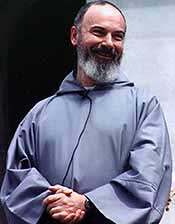 In the past days the story of Father John Corapi’s taking a break from the Catholic priesthood has been circulating. In the meantime, read the current news of Father Corapi, 64, on his blog, The Black Sheep Dog.
In the past days the story of Father John Corapi’s taking a break from the Catholic priesthood has been circulating. In the meantime, read the current news of Father Corapi, 64, on his blog, The Black Sheep Dog.
The Primacy of the Human, develop a human ecology, Pope reminds
The primacy of the human is based on our belief in the transcendent. All aspects of the human person –politics, philosophy, ethics, economics and medicine– are rooted in the respect of and in engagement with the Divine. Catholics will further develop this idea of the transcendent by reflecting on the Trinity of the Godhead, God the Father, God the Son, and God the Holy Spirit. A personal God who lives and is active in history. The pope addressed the new ambassadors of Moldova, Equatorial Guinea, Belize, Syria, Ghana and New Zealand on 9 June when they presented their diplomatic credentials to the Holy See. Ordinarily, one doesn’t pay lots of attention to papal discourses made to the diplomats but it seems that there is some serious thinking going on here with the Pope viz. this sector of his ministry.
Continue reading The Primacy of the Human, develop a human ecology, Pope reminds
Vatican and Good Samaritan Foundation talk on AIDS
Stats for those living with HIV-AIDS is somewhere around 33 million, records the World Health Organization (WHO). Recently, the HIV-AIDS epidemic was studied at a Rome conference hosted by the Holy See and the Good Samaritan Foundation. The conference was titled “The Centrality of Care for the Person in the Prevention and Treatment of Illnesses caused by HIV and AIDS.”
Various experts and Vatican officials, including the Pope’s Secretary of State, Cardinal Tarcisio Bertone, where he said that our work ought to be centered on the patient in way that a holistic approach is followed: the whol person and not only the disease needs to competent assistance and friendship. Experts from 26 countries attended the conference.
It is estimated that there are some thing like 117,000 health centers across the globe that treat AIDS patients. With all the money wasted on frivolous things, the WHO said their research revealed that in 2009 about $16 million was used for AIDS research and treatments. Problems exist in medical care and safety because only 35 percent of patients in third world countries have access to treatment. Do the math: roughly 10 million people don’t have access to any type of medication and proper health care.
Vatican seeks Guidelines in dealing with cases of sexual abuse of minors by clerics
The Congregation for the Doctrine of the Faith delivered a circular letter to the world’s bishops asking for help in working for the common good of the faithful –protecting children from abusive priests. The CDF wants each of the bishops’ conferences around the globe to develop the appropriate processes assist the diocesan bishops in helping victim, educating the ecclesial community, forming priests, and being clear agents of charity and justice.
Pope addresses the Pontifical Academy of Social Sciences: true freedom of religion permits human fulfillment & the common good
The regular cycle of the Pope’s work is addressing those groups that advise him on a variety of subjects like theology, law, science, politics, life issues, etc. Benedict’s address to Professor Mary
Ann Glendon, President of the Pontifical Academy of Social Sciences, talks about the theme of “Universal
Rights in a World of Diversity: the Case of Religious Freedom.” He reminds not only the head of this academy about the deep roots of Western culture being Christian, but it was Christianity that gave humanity the awareness of the various freedoms we know and love, that contribute to human flourishing and many time even take for granted. It was the Christian gospel that upheld and promoted the dignity of the human person, protected women and children, that organized labor freedom of worship, and other social systems. Most notably, the Pope reminds us, that the freedoms spoken of in the United Nations’ Universal Declaration of Human
Rights have their roots in our belief and life in Christ. However, we can’t become smug –too satisfied– with what we’ve been given, even freedom. The Pope’s talk is not long but here are some germaine points for us to consider:
Deeply inscribed
in our human nature are a yearning for truth and meaning and an openness to the
transcendent; we are prompted by our nature to pursue questions of the greatest
importance to our existence. Many centuries ago, Tertullian coined the term libertas
religionis (cf. Apologeticum, 24:6). He emphasized that God must be worshipped
freely, and that it is in the nature of religion not to admit coercion, “nec
religionis est cogere religionem” (Ad Scapulam, 2:2). Since man enjoys the
capacity for a free personal choice in truth, and since God expects of man a
free response to his call, the right to religious freedom should be viewed as
innate to the fundamental dignity of every human person, in keeping with the
innate openness of the human heart to God. In fact, authentic freedom of
religion will permit the human person to attain fulfilment and will thus
contribute to the common good of society.
